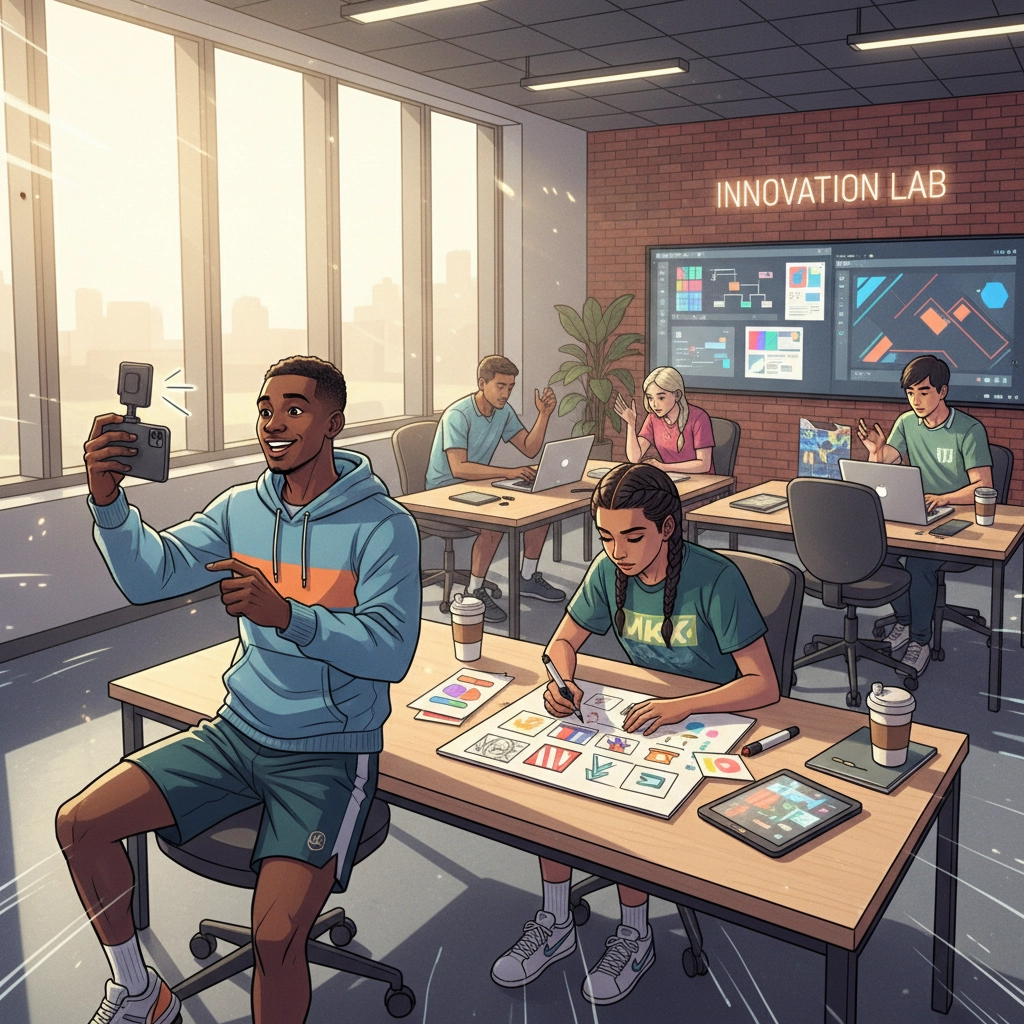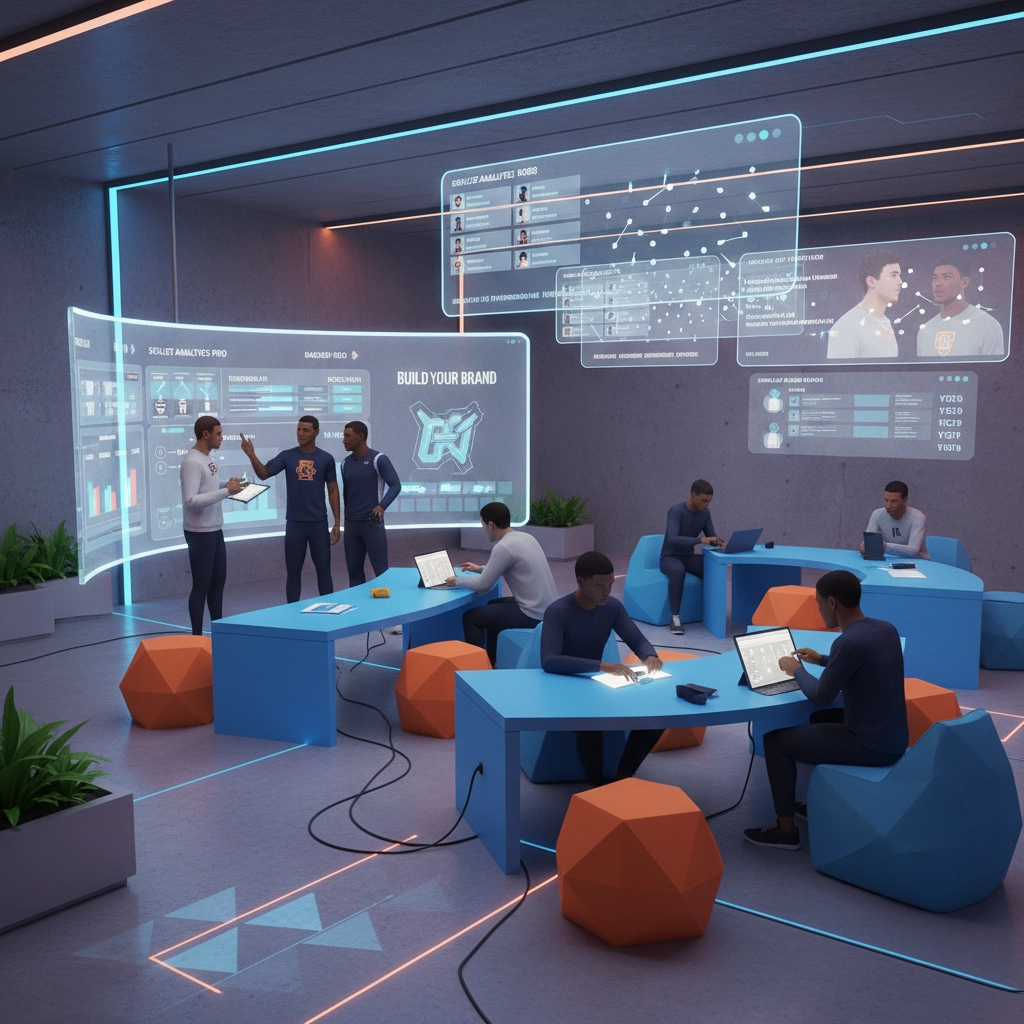The introduction of Name, Image, and Likeness (NIL) regulations has fundamentally transformed the landscape of collegiate athletics. Student-athletes now possess the ability to monetize their personal brand while maintaining their eligibility. This shift has created an immediate need for comprehensive educational resources that address the complexities of personal branding, business development, and financial management.
Educational workshops for NIL athletes serve as essential foundation-building tools in this evolving environment. These programs address the gap between athletic talent and business acumen, providing structured learning opportunities that extend beyond traditional sports training. The implementation of systematic educational frameworks ensures athletes possess the necessary knowledge to navigate commercial opportunities effectively.
The Business Incubator Framework

Business incubation programs for student-athletes represent a structured approach to entrepreneurial development. These programs function as controlled environments where athletes can develop business concepts, test marketing strategies, and build professional networks. The incubator model provides mentorship opportunities, resource allocation, and strategic guidance tailored specifically to the unique circumstances of student-athletes.
The typical business incubator framework for NIL athletes incorporates several key components. Initial assessment phases evaluate individual strengths, market positioning potential, and personal brand development opportunities. Following assessment, participants engage in structured curriculum modules covering business fundamentals, brand management, and digital marketing strategies.
Resource allocation within the incubator model includes access to professional development tools, marketing platforms, and industry expertise. Participants receive guidance on contract negotiations, intellectual property protection, and revenue stream diversification. The structured environment allows for experimentation with various monetization approaches while maintaining compliance with applicable regulations.
Mentorship components connect student-athletes with industry professionals, successful former athletes, and business development specialists. These relationships provide practical insights into market dynamics, career planning, and long-term wealth building strategies. The mentorship structure ensures continuity of support throughout the educational process.
Educational Series Structure
The educational series for NIL athletes follows a systematic approach to skill development and knowledge acquisition. Course modules are designed to build upon foundational concepts while addressing increasingly complex business scenarios. The series typically spans multiple sessions, allowing for comprehensive coverage of essential topics.
Foundational modules address basic business principles, including market analysis, target audience identification, and value proposition development. These sessions establish common understanding among participants regardless of their prior business experience. The curriculum emphasizes practical application of theoretical concepts through real-world case studies and interactive exercises.

Advanced modules delve into specialized topics such as social media strategy, content creation, and audience engagement. Participants learn to leverage digital platforms effectively while maintaining authentic personal brand representation. The curriculum includes hands-on practice with content development tools and analytics platforms.
Financial literacy components address budgeting, investment strategies, and tax implications of NIL earnings. These sessions provide essential knowledge for responsible financial management and long-term wealth building. The curriculum covers both immediate earning opportunities and strategic planning for post-athletic careers.
Legal and compliance modules ensure participants understand regulatory requirements, contract structures, and risk management strategies. These sessions address common pitfalls and provide guidance for maintaining eligibility while maximizing commercial opportunities. The curriculum emphasizes the importance of professional legal counsel in complex transactions.
Internship Opportunities in Sports Media
Sports media internships provide valuable hands-on experience in content creation, audience development, and brand management. These programs connect student-athletes with established media organizations, digital platforms, and content creation studios. Internship placements offer practical experience while building professional networks within the industry.
Content creation internships focus on developing skills in video production, writing, and digital storytelling. Participants work alongside experienced content creators to produce materials for various platforms and audiences. These experiences provide insight into the creative process while building technical skills essential for personal brand development.

Marketing and promotion internships address audience development, campaign management, and performance analytics. Participants gain experience with social media management, influencer collaboration, and brand partnership development. These roles provide understanding of the business side of content creation and audience monetization.
Broadcasting and journalism internships offer exposure to traditional media production and distribution. Participants work with professional broadcasting teams, sports journalism organizations, and digital media companies. These experiences provide insight into career opportunities beyond playing professional sports.
Digital platform management internships focus on the technical aspects of online presence and audience engagement. Participants learn about website development, social media optimization, and analytics interpretation. These skills prove valuable for managing personal brands and commercial partnerships effectively.
Workshop Implementation and Structure
Workshop implementation follows standardized procedures to ensure consistent delivery and measurable outcomes. Session structure incorporates presentation components, interactive exercises, and practical application opportunities. The format accommodates varying learning styles while maintaining focus on actionable skill development.
Presentation components deliver essential information through structured lectures and multimedia content. These segments cover theoretical foundations and industry best practices. The curriculum incorporates real-world examples and case studies to illustrate key concepts and potential applications.
Interactive exercises engage participants in problem-solving activities, group discussions, and peer learning opportunities. These components encourage active participation and knowledge sharing among workshop attendees. The exercises are designed to reinforce learning objectives while building collaborative skills.

Practical application opportunities allow participants to implement newly acquired knowledge in controlled environments. These activities include brand development exercises, content creation assignments, and business plan development. The practical components provide immediate feedback and skill validation.
Skills Development and Competency Building
The workshop curriculum addresses multiple competency areas essential for successful NIL participation. Business development skills include market research, competitive analysis, and strategic planning capabilities. These competencies enable athletes to identify opportunities and develop sustainable revenue streams.
Communication skills development focuses on public speaking, written communication, and digital presentation abilities. Participants learn to articulate their personal brand effectively across various media formats and audience segments. These skills prove essential for building authentic connections with fans and commercial partners.
Technology competencies address social media management, content creation tools, and analytics platforms. Participants develop proficiency with digital marketing tools and data analysis techniques. These technical skills enable effective management of online presence and audience engagement efforts.
Financial management skills include budgeting, investment planning, and tax preparation knowledge. Participants learn to manage earnings responsibly while planning for long-term financial security. These competencies address both immediate earning optimization and career transition planning.
Program Evaluation and Continuous Improvement
Program evaluation mechanisms ensure workshop effectiveness and participant satisfaction. Assessment methods include pre- and post-program skill evaluations, participant feedback surveys, and long-term outcome tracking. The evaluation process identifies areas for curriculum improvement and program optimization.
Participant feedback collection occurs through structured surveys, focus groups, and individual interviews. This input provides insight into program strengths and areas requiring enhancement. The feedback process ensures programs remain relevant and responsive to participant needs.
Outcome tracking follows participants beyond program completion to assess real-world application of acquired skills. Success metrics include NIL earning performance, brand development progress, and career advancement outcomes. This data informs program refinement and demonstrates value to stakeholders.
Continuous improvement initiatives incorporate evaluation findings into curriculum updates and delivery method enhancements. The process ensures programs remain current with industry developments and regulatory changes. Regular updates maintain program relevance and effectiveness over time.
The educational workshop framework provides student-athletes with essential tools for navigating the NIL landscape effectively. Through structured learning opportunities, practical application experiences, and ongoing support, participants develop competencies necessary for successful brand monetization and long-term career planning. The comprehensive approach addresses immediate learning needs while building foundations for sustained success beyond collegiate athletics.
